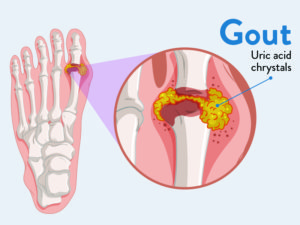Dr. Stuart Weisman On: Causes, Symptoms and Treatment of Gout
Short and Long-Term Strategies to Manage Gout Pain
 Gout is a kind of arthritis that causes painful and stiff joints and can strike suddenly, causing excruciating pain and swelling. “Gout usually affects a big toe, but can also attack the ankle, knee, foot, elbow or fingers,” said Dr. Stuart Weisman, rheumatology specialist at Boulder Medical Center. Dr. Weisman recently spoke during a free lecture sponsored by Boulder Community Health.
Gout is a kind of arthritis that causes painful and stiff joints and can strike suddenly, causing excruciating pain and swelling. “Gout usually affects a big toe, but can also attack the ankle, knee, foot, elbow or fingers,” said Dr. Stuart Weisman, rheumatology specialist at Boulder Medical Center. Dr. Weisman recently spoke during a free lecture sponsored by Boulder Community Health.
“Gout is a type of arthritis that occurs when you have high levels of uric acid in your blood,” explained Dr. Weisman. “Over time, the uric acid forms needle-sharp crystals that collect around your joints and soft tissues. Eventually, these crystals trigger a gout attack.”
Symptoms of gout include:
- Sudden, intense and excruciating joint pain typically the big toe or ankle, sometimes the knee, hand or wrist
- The affected joint becomes so tender that even the slightest touch can be unbearable
- Swelling, inflammation with the feeling that the joint is very warm or even hot
- Red or purple skin around the affected joint
- Fever in more extreme cases
“Fortunately, gout will clear in time and there is a lot we can do to prevent future attacks,” said Dr. Weisman.
Strategies for Relief During Gout Attacks
Gout attacks can be quite severe, so it’s good to know how to quell the pain as soon as possible, said Dr. Weisman. He offered a few options for relief of gout flare-ups:
- Over-the-Counter Drugs
Take nonsteroidal anti-inflammatory drugs (NSAIDS) early in an attack and at a maximum dose. For example, you could take a naproxen dosage of 500MG two times a day. - Corticosteroids
Your doctor can prescribe a 5- to 14-day course of corticosteroids to reduce inflammation. - Colchicine
This medication is best taken at the onset of an attack; prescription colchicine can help decrease pain and swelling.
“All of these options have possible side effects and should not be taken without checking with your doctor first,” Dr. Weisman warned. “It’s also important to note that medications like diuretics, niacin, and event low-dose aspirin can cause your uric acid levels to rise. Be sure to mention that you have gout if your doctor is planning to start you on a new medicine.”
Managing Gout – Foods to Avoid
If you’re prone to gout, the foods you eat and don’t eat, as well as your lifestyle choices can be key in controlling the disease, Dr. Weisman said. Foods that are high in purines, a natural substance that increases the production of uric acid in your body, can trigger gout attacks. Some foods to avoid:
- Sugary Foods and Beverages
- High-Fructose Corn Syrup
- Organ Meats Like Liver or Tongue
- Red Meat Including Beef, Lamb and Pork
- Seafood
- Beer, Wine and Liquor
“The worst types of seafood are anchovies, herring, sardines, trout, tuna and shellfish,” said Dr. Weisman. “Alcohol exacerbates gout by increasing uric acid production and decreasing excretion of uric acid. In addition, beer adds purines to your blood.”
Lifestyle Modifications can Prevent Gout Attacks
The good news about gout is that lifestyle changes can help prevent attacks or at least lessen the severity. A few suggestions from Dr. Weisman:
- Hydrate – water helps remove uric acid from the body and lubricates your joints
- Maintain a healthy weight – this can lower uric acid levels and significantly reduce the risk of gout attacks
- Include nonfat and low-fat dairy foods in your diet
- Eat lots of vegetables
- Get regular exercise — if you are not exercising now, ask your doctor about a plan that is right for you
Dr. Weisman added that “one study showed cherries might reduce the risk of gout attacks. Another suggested that high doses of regular or decaf coffee — four cups a day or more — can be helpful.” Ask your about lifestyle changes that might be helpful.
Don’t Leave Gout Untreated
Dr. Weisman wrapped up his lecture with a warning that gout can cause destructive joint disease and uric acid tophi if left untreated. Tophi are deposits of urate crystals in people who have excess uric acid in their blood for a prolonged period of time. The deposits collect in and around joints, tendons, and soft tissues. Usually, they appear a decade or longer after the initial gout attack. “To prevent this from happening, your doctor might prescribe the long-term use of uric acid,” he said. Be sure to ask your doctor.
About Dr. Stuart Weisman, MD
Rheumatology Department
Boulder Medical Center
Dr. Weisman opened his rheumatology practice at Boulder Medical Center in 2002. Rheumatology is a sub-specialty in internal medicine that is devoted to diagnosing and treating arthritis and other musculoskeletal conditions and autoimmune diseases. Dr. Weisman treats the full range of rheumatic conditions including:
- Rheumatoid Arthritis
- Lupus
- Osteoarthritis
- Psoriatic Arthritis
- Ankylosing Spondylitis
- Gout
- Vasculitis
- Sjogren’s Syndrome
- Regional Musculoskeletal Pain (e.g. Neck Pain, Shoulder Pain)
- Soft Tissue Rheumatic Disorders (e.g. Myofascial Pain, Fibromyalgia)
Dr. Weisman also serves as the Medical Research Director at Boulder Medical Center. When not caring for patients, he enjoys Colorado’s natural beauty, access to the great outdoors, and abundant sunshine. “I am very fortunate to share the Colorado lifestyle with my wife and two daughters,” he says. “I enjoy camping with my family, hiking, mountain biking and skiing.”
Learn more
-
Dr. Weisman’s Full Profile
-
Dr. Weisman’s Notes on Gout
- To Schedule an Appointment, call 303-440-3137


